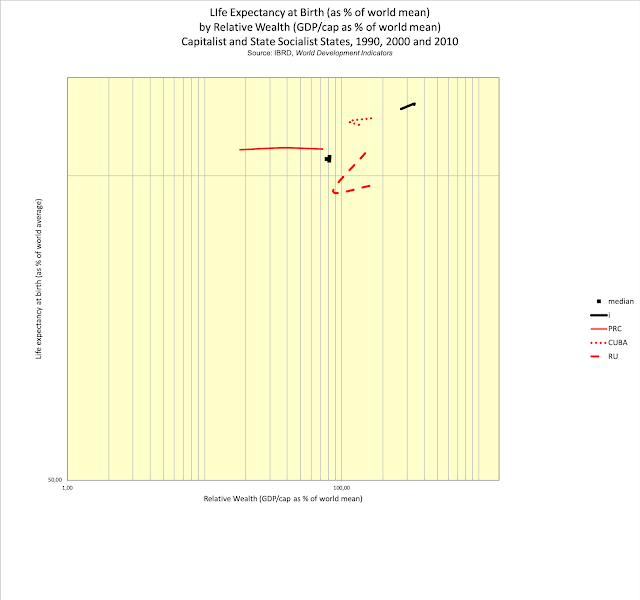The Poorer (Former-)State-Socialist Helping the Rich
The latest news is that Cuba has sent a medical team to Lombardy. China has also been sending supplies to Italy, as well as a number of other European countries. Russia is also dispatching equipment, medicines and army doctors to Italy, as it is struggling with the wide spread of the COVID2019 virus.
It might be useful to visualize the four actors mentioned here, in terms of their position in the global geopolitical economy of income and health. I created a graph basically to observe these relations in two-dimensional space. And to ask a simple question.
On the horizontal dimension, the diagram depicts the four countries in terms of their per capita Gross Domestic Product. Vertically, we see their life expectancies at birth. Both measures are for the years 1990, 2000 and 2010, and both are expressed as percentiles of the world average in the given years. The red and black lines in the graph symbolize the four countries’ trajectories. The data come from the World Development Indicators dataset of the World Bank.
Clearly, Italy is by far the richest among the four (in the diagram, it is the farthest to the right). As one would predict it, given what we know about how comparative national income levels impact overall health, Italy's life expectancy at birth is also the highest. And, yet, it is Italy is the one in state in trouble in terms of its ability to handle the virus. And the three countries marked with red--one currently state socialist, another state socialist until a generation ago, the third somewhere in never-never land "in between"--are able / willing to provide humanitarian help. So, here is my question:
How would you explain this "anomaly"? How is it possible that the richest of the four is the one in trouble and the poorer ones--neither rich, nor liberal-capitalist--are (able to) help it?
UPDATE ON APRIL 5, 2020
So, as it turns out, the legacies of state socialism might be coming in to "play" when it comes to saving humankind. A recent clinical study argues that BCG--a vaccine introduced in eastern Europe and the USSR as a requirement for all citizens--might prove effective against the COVID2019 virus. This is indirectly supported by the observation, reported in The New York Times a few days ago, that the incidence of diagnosed cases of COVID2019 infection is significantly lower in the territories of today's Germany that used to be part of the erstwhile German Democratic Republic than elsewhere in Germany.
Reuters lays out the claim nicely:
"Researchers from the New York Institute of Technology (NYIT) analysed the global spread of COVID-19, correlated it with data from the world BCG Atlas that shows which countries have BCG vaccine coverage, and came to the conclusion that countries with a policy for universal BCG vaccination have had a lower number of cases than those like the US, where universal BCG vaccination was discontinued after the incidence of TB came down, and Italy."
Clearly, an unintended consequence, if true. Russian doctors are also surprised.
It might be useful to visualize the four actors mentioned here, in terms of their position in the global geopolitical economy of income and health. I created a graph basically to observe these relations in two-dimensional space. And to ask a simple question.
On the horizontal dimension, the diagram depicts the four countries in terms of their per capita Gross Domestic Product. Vertically, we see their life expectancies at birth. Both measures are for the years 1990, 2000 and 2010, and both are expressed as percentiles of the world average in the given years. The red and black lines in the graph symbolize the four countries’ trajectories. The data come from the World Development Indicators dataset of the World Bank.
Clearly, Italy is by far the richest among the four (in the diagram, it is the farthest to the right). As one would predict it, given what we know about how comparative national income levels impact overall health, Italy's life expectancy at birth is also the highest. And, yet, it is Italy is the one in state in trouble in terms of its ability to handle the virus. And the three countries marked with red--one currently state socialist, another state socialist until a generation ago, the third somewhere in never-never land "in between"--are able / willing to provide humanitarian help. So, here is my question:
How would you explain this "anomaly"? How is it possible that the richest of the four is the one in trouble and the poorer ones--neither rich, nor liberal-capitalist--are (able to) help it?
UPDATE ON APRIL 5, 2020
So, as it turns out, the legacies of state socialism might be coming in to "play" when it comes to saving humankind. A recent clinical study argues that BCG--a vaccine introduced in eastern Europe and the USSR as a requirement for all citizens--might prove effective against the COVID2019 virus. This is indirectly supported by the observation, reported in The New York Times a few days ago, that the incidence of diagnosed cases of COVID2019 infection is significantly lower in the territories of today's Germany that used to be part of the erstwhile German Democratic Republic than elsewhere in Germany.
Reuters lays out the claim nicely:
"Researchers from the New York Institute of Technology (NYIT) analysed the global spread of COVID-19, correlated it with data from the world BCG Atlas that shows which countries have BCG vaccine coverage, and came to the conclusion that countries with a policy for universal BCG vaccination have had a lower number of cases than those like the US, where universal BCG vaccination was discontinued after the incidence of TB came down, and Italy."
Clearly, an unintended consequence, if true. Russian doctors are also surprised.



Comments
Post a Comment